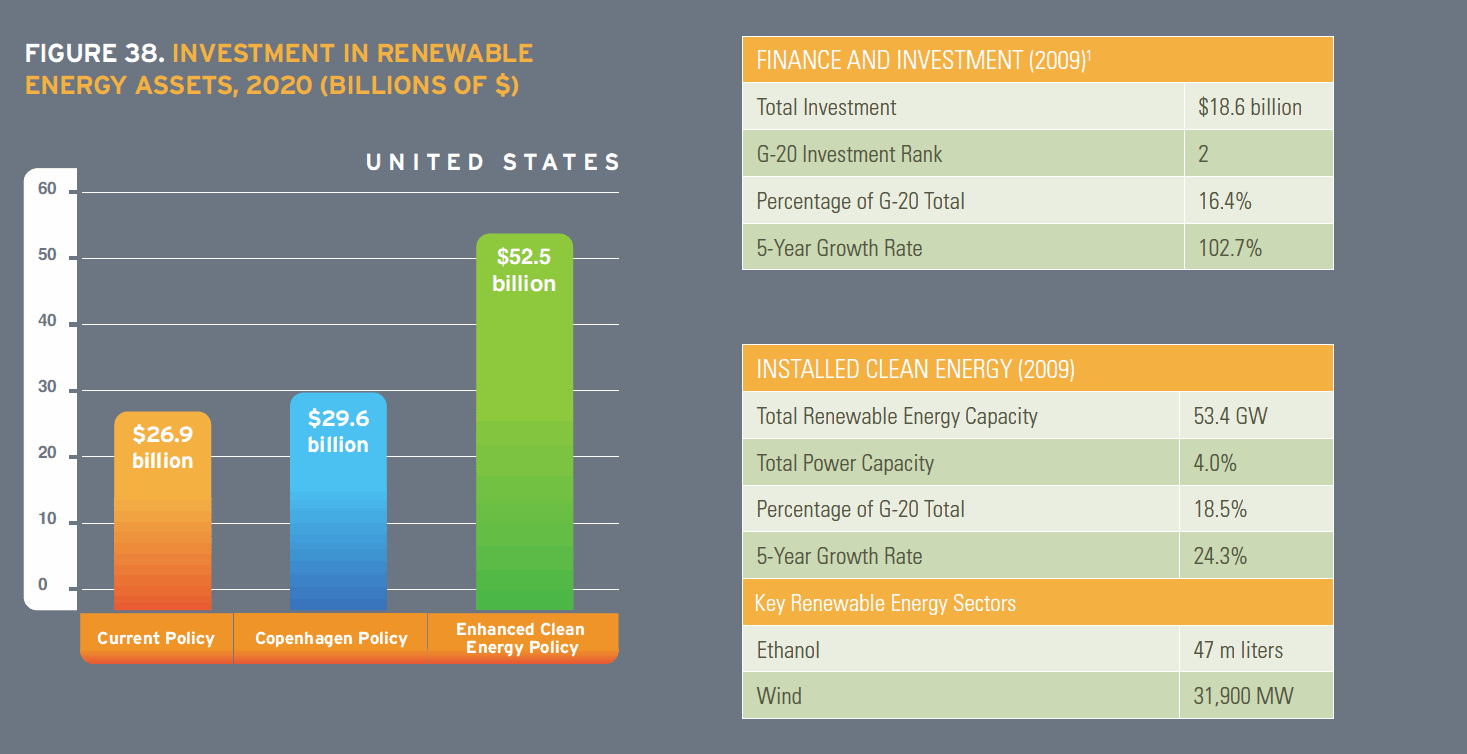PEW ENVIRONMENTAL GROUP
Executive Summary
Over the last half decade, the clean energy economy has emerged around the world as a major new opportunity for investment, manufacturing, jobs and environmental protection. This report explores scenarios for the dynamic expansion of electricity from renewable resources over the next decade.
The future trajectory of investments in clean power projects over the next decade will be determined by the strength of policies adopted by G-20 countries. If clean energy policies are strengthened significantly in the coming years, we project that $2.3 trillion will be invested in clean power assets over the next 10 years, offering companies and countries enormous opportunities to compete for investments, jobs and export markets. Under current policies, however, cumulative investments would only reach $1.7 trillion over the next decade. In other words, strong policies would leverage an additional $546 billion worth of investment.
In all scenarios, clean energy power investments shift to Asia, led by dramatic increases in China and India. Still, all countries stand to gain from adoption of enhanced clean energy policies. The United States is a case in point as one of the three countries (along with India and the United Kingdom) that have the most to gain from adoption of aggressive clean energy policies, when enhanced policies are compared to current policies.
From an environmental perspective, current and Copenhagen policies (associated with pledges made at the 2009 Climate Summit) are insufficient – only enhanced clean energy policies will ensure that the power sector contributes to the scientific goal of curtailing global warming at two degrees Celsius.
The clean energy economy has emerged rapidly in recent years. The Pew Charitable Trusts March 2010 report, Who’s Winning the Clean Energy Race? Growth, Competition and Opportunity in the World’s Largest Economies, chronicled the dawning of the global clean energy economy from 2005 to 2009. That report looked at 2009 investment totals and trends in the G-20 member nations, which together account for more than 90 percent of the world’s clean energy finance and investment. Our first report found that clean energy investment increased by 230 percent from 2005-2009 to $162 billion.
We found that China, for the first time, led the world in attracting clean energy investment and ranked at or near the top of all G-20 countries in nearly every measurement of clean energy growth. In contrast, the report found that the United States fell to second in the world in attracting clean energy investment and lagged behind other leaders on a variety of key metrics.
While our first report looked at past trends, Global Clean Power: A $2.3 Trillion Opportunity, examines three policy scenarios for future growth in clean energy investment, all of which present opportunities for the G-20 overall and for each nation comprising it.
…
The United States Would Benefit From Strong Clean Energy Policies
While renewable energy asset financing is projected to rise in the United States under all scenarios, the United States would benefit from strong clean energy policies. If enhanced national clean energy policies were enacted, investment would ramp up to $53 billion annually by 2020—a rise of 237 percent over 2010 levels. Under current and Copenhagen policies, investment rises 73 and 90 percent, respectively. Cumulatively the United States has the potential to attract $342 billion in private clean energy investments over the next decade. In fact, the United States is one of the three countries with the most to gain from adoption of aggressive clean energy policies, when enhanced policies are compared to current policies. The difference between cumulative investments in the current policies and enhanced clean energy policies scenarios for the United States is $97 billion (40 percent). Only India and the United Kingdom, which could increase cumulative investments 48 percent under the enhanced policy scenario, have the potential to increase investments at a higher rate.
Download full report (PDF): Global Clean Power
www.pewtrusts.org
About the Pew Environmental Group
“The Pew Charitable Trusts applies the power of knowledge to solve today’s most challenging problems. Pew employs a rigorous, analytical approach to improve public policy, inform the public and stimulate civic life. The Pew Environment Group promotes practical, meaningful solutions to some of the world’s most pressing environmental problems.”
Tags: Pew Charitable Trusts, Pew Environmental Group, Solar Energy, Wind Energy







 RSS Feed
RSS Feed